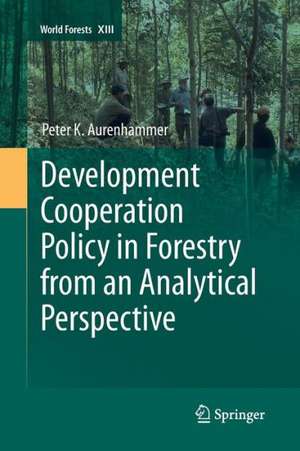Development Cooperation Policy in Forestry from an Analytical Perspective: World Forests, cartea 13
Autor Peter Aurenhammeren Limba Engleză Paperback – 21 sep 2014
| Toate formatele și edițiile | Preț | Express |
|---|---|---|
| Paperback (1) | 947.35 lei 43-57 zile | |
| SPRINGER NETHERLANDS – 21 sep 2014 | 947.35 lei 43-57 zile | |
| Hardback (1) | 953.35 lei 43-57 zile | |
| SPRINGER NETHERLANDS – 14 aug 2012 | 953.35 lei 43-57 zile |
Din seria World Forests
- 15%
 Preț: 646.43 lei
Preț: 646.43 lei - 15%
 Preț: 643.48 lei
Preț: 643.48 lei - 18%
 Preț: 1235.43 lei
Preț: 1235.43 lei - 18%
 Preț: 1225.94 lei
Preț: 1225.94 lei - 15%
 Preț: 631.53 lei
Preț: 631.53 lei - 18%
 Preț: 1233.37 lei
Preț: 1233.37 lei - 18%
 Preț: 943.57 lei
Preț: 943.57 lei - 18%
 Preț: 946.41 lei
Preț: 946.41 lei - 18%
 Preț: 953.35 lei
Preț: 953.35 lei - 18%
 Preț: 1559.80 lei
Preț: 1559.80 lei - 15%
 Preț: 644.95 lei
Preț: 644.95 lei - 15%
 Preț: 640.06 lei
Preț: 640.06 lei - 15%
 Preț: 645.60 lei
Preț: 645.60 lei - 18%
 Preț: 1223.55 lei
Preț: 1223.55 lei - 18%
 Preț: 730.35 lei
Preț: 730.35 lei - 18%
 Preț: 1107.56 lei
Preț: 1107.56 lei - 18%
 Preț: 1240.30 lei
Preț: 1240.30 lei - 18%
 Preț: 952.40 lei
Preț: 952.40 lei - 20%
 Preț: 552.12 lei
Preț: 552.12 lei - 18%
 Preț: 954.45 lei
Preț: 954.45 lei - 24%
 Preț: 779.23 lei
Preț: 779.23 lei - 24%
 Preț: 1058.44 lei
Preț: 1058.44 lei - 18%
 Preț: 943.57 lei
Preț: 943.57 lei
Preț: 947.35 lei
Preț vechi: 1155.30 lei
-18% Nou
Puncte Express: 1421
Preț estimativ în valută:
181.28€ • 189.75$ • 150.88£
181.28€ • 189.75$ • 150.88£
Carte tipărită la comandă
Livrare economică 31 martie-14 aprilie
Preluare comenzi: 021 569.72.76
Specificații
ISBN-13: 9789400794863
ISBN-10: 940079486X
Pagini: 356
Ilustrații: XXXII, 324 p.
Dimensiuni: 155 x 235 x 19 mm
Greutate: 0.5 kg
Ediția:2013
Editura: SPRINGER NETHERLANDS
Colecția Springer
Seria World Forests
Locul publicării:Dordrecht, Netherlands
ISBN-10: 940079486X
Pagini: 356
Ilustrații: XXXII, 324 p.
Dimensiuni: 155 x 235 x 19 mm
Greutate: 0.5 kg
Ediția:2013
Editura: SPRINGER NETHERLANDS
Colecția Springer
Seria World Forests
Locul publicării:Dordrecht, Netherlands
Public țintă
GraduateCuprins
Foreword.- Preface.- Acknowledgments.- Glossary and Acronyms (List of acronyms and definitions).- 1: Methodological approach, definitions and selection of empiricism.- 2: Forestry problems versus political factors- The domination of political factors over problem pressure.- 3: Actors’ potential to have an impact on change in Forest Aid.- 4: Subsystems of the bilateral foreign policy system and their actors’ influence on program formulation and implementation.- 5: Poverty reduction through forest development interventions? Grass-root responses to forest aid: economic miracles or the satisfaction of basic needs?.- 6: Excursus: Capacity construction, capacity destruction – Whose capacities development cooperation builds upon?.- 7: Discussion and Conclusions.- Résumé.
Textul de pe ultima copertă
Any reader eager to gain a comprehensive insight into forest development policy, praxis and reality shouldn’t miss this excellent publication. Hard to find a comparable reading where the author is digging deep into forest development policy while at the same time providing a high-level analysis and focused quantitative and qualitative results on a complex matter.
The author discovered numerous highly relevant theories as well as inspiring cases about forests and people from around the world. The mosaic of theoretical and empirical knowledge has already found important readers.
A central dimension of the analytical research is the focus on ‘change’ rather than ‘development’ and on the role of various actors in creating or preventing ‘change’. While the book aims at explaining parts of the complex reality of forest development policy, it does not shy to describe and compare the results with various normative beliefs and concepts on how development cooperation should/must look like.
All individual theoretical arguments and empirical proofs are well based and shed light into the political process of forest development policy. Both readers with theoretical interests as well as readers interested in forest issues from the point of view of practice will discover important information and inspiring thoughts in the book.
This book is the publication of the doctoral thesis of the author, being based on a project that provided praxis relevant advice to policy makers and forestry experts. The scientific board was highly pleased by the theoretical sound and empirical rich arguments of the book.
The author discovered numerous highly relevant theories as well as inspiring cases about forests and people from around the world. The mosaic of theoretical and empirical knowledge has already found important readers.
A central dimension of the analytical research is the focus on ‘change’ rather than ‘development’ and on the role of various actors in creating or preventing ‘change’. While the book aims at explaining parts of the complex reality of forest development policy, it does not shy to describe and compare the results with various normative beliefs and concepts on how development cooperation should/must look like.
All individual theoretical arguments and empirical proofs are well based and shed light into the political process of forest development policy. Both readers with theoretical interests as well as readers interested in forest issues from the point of view of practice will discover important information and inspiring thoughts in the book.
This book is the publication of the doctoral thesis of the author, being based on a project that provided praxis relevant advice to policy makers and forestry experts. The scientific board was highly pleased by the theoretical sound and empirical rich arguments of the book.
Caracteristici
An analytical approach providing the reader with a comprehensive insight to many realities of forest development cooperation, its role and relevancy and the actors able to have an impact on change Providing high-level analysis and grass-root level, practical examples, enabling the reader to grasp a complex matter Contains more than 30 colour illustrations/tables














